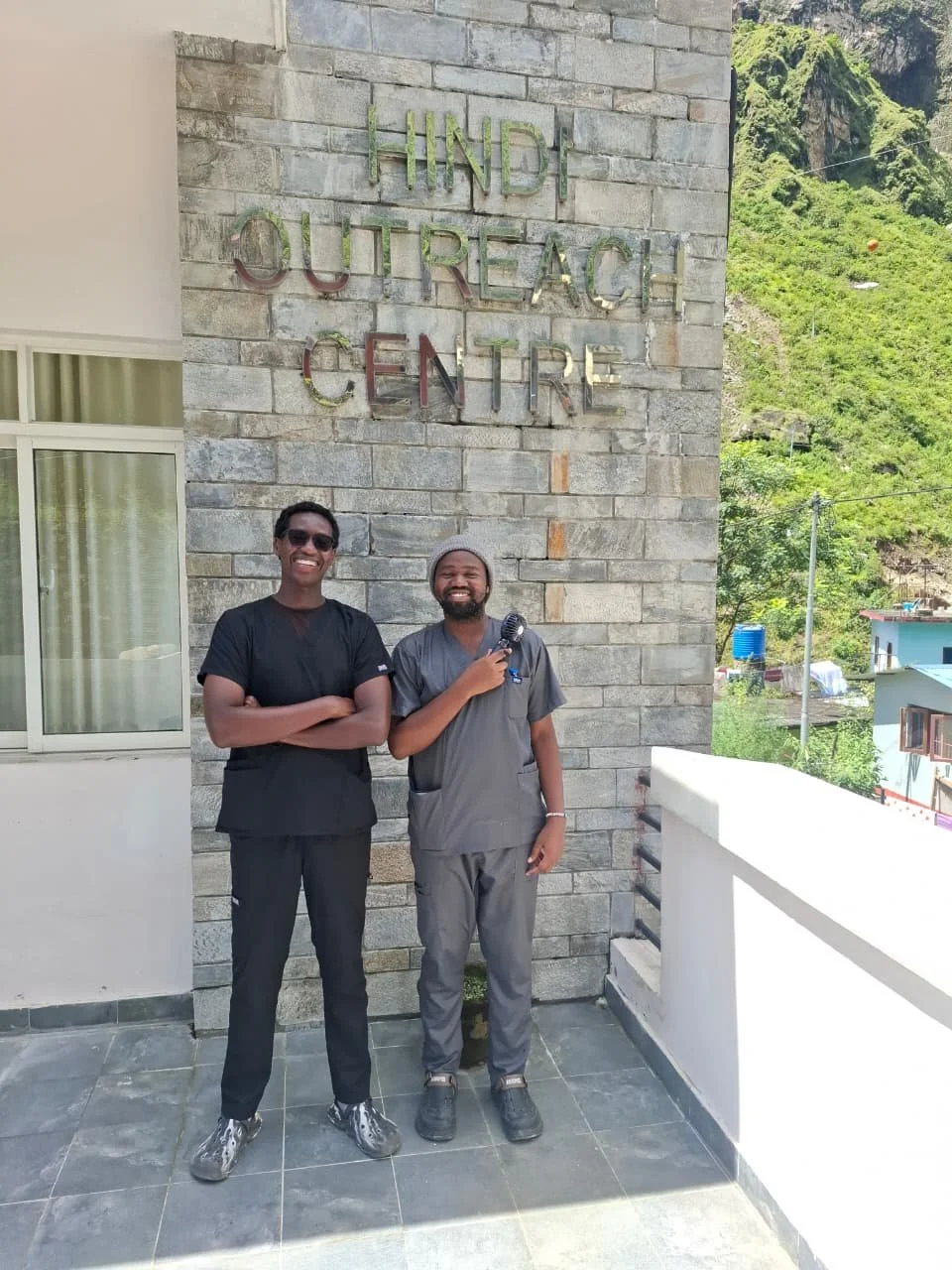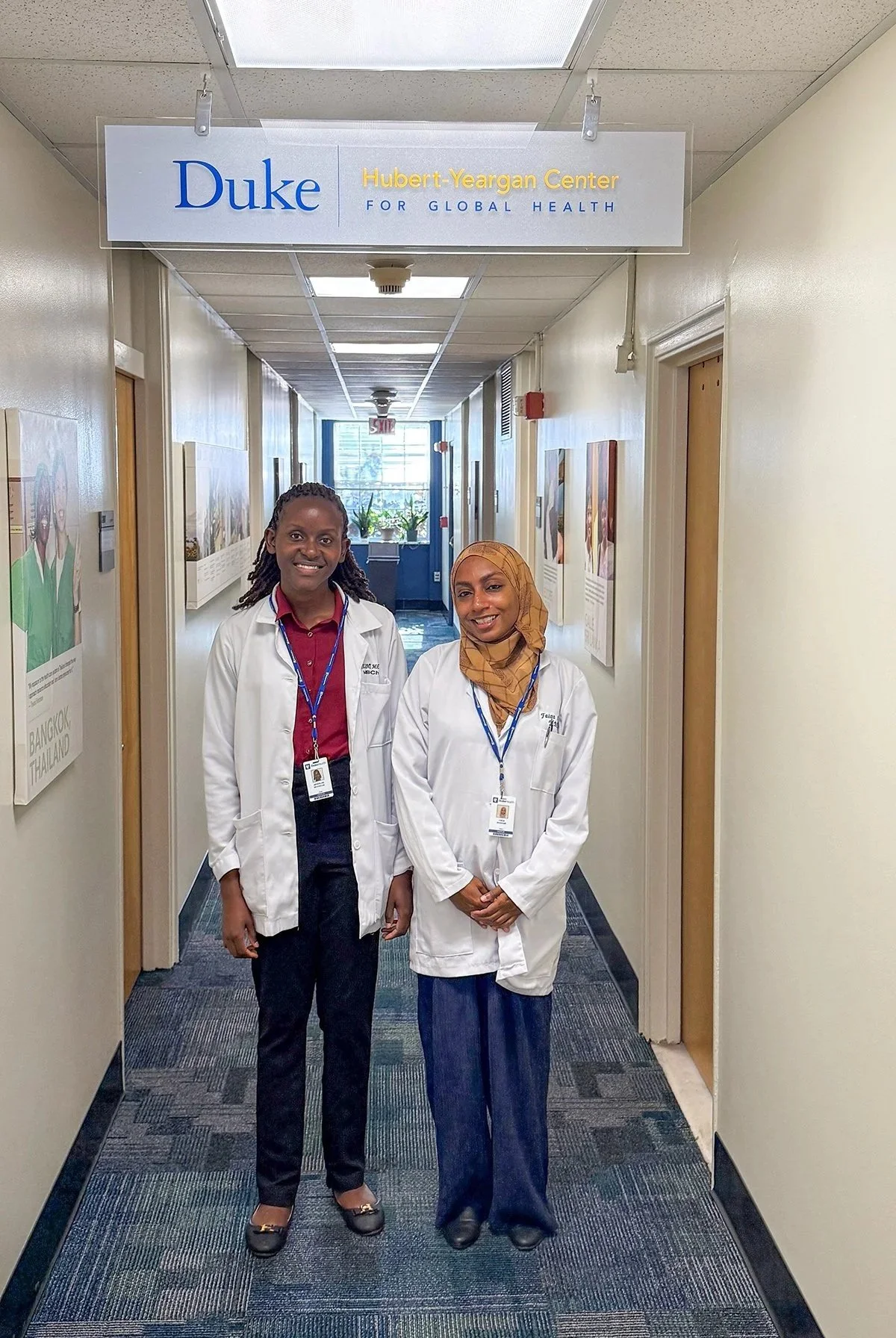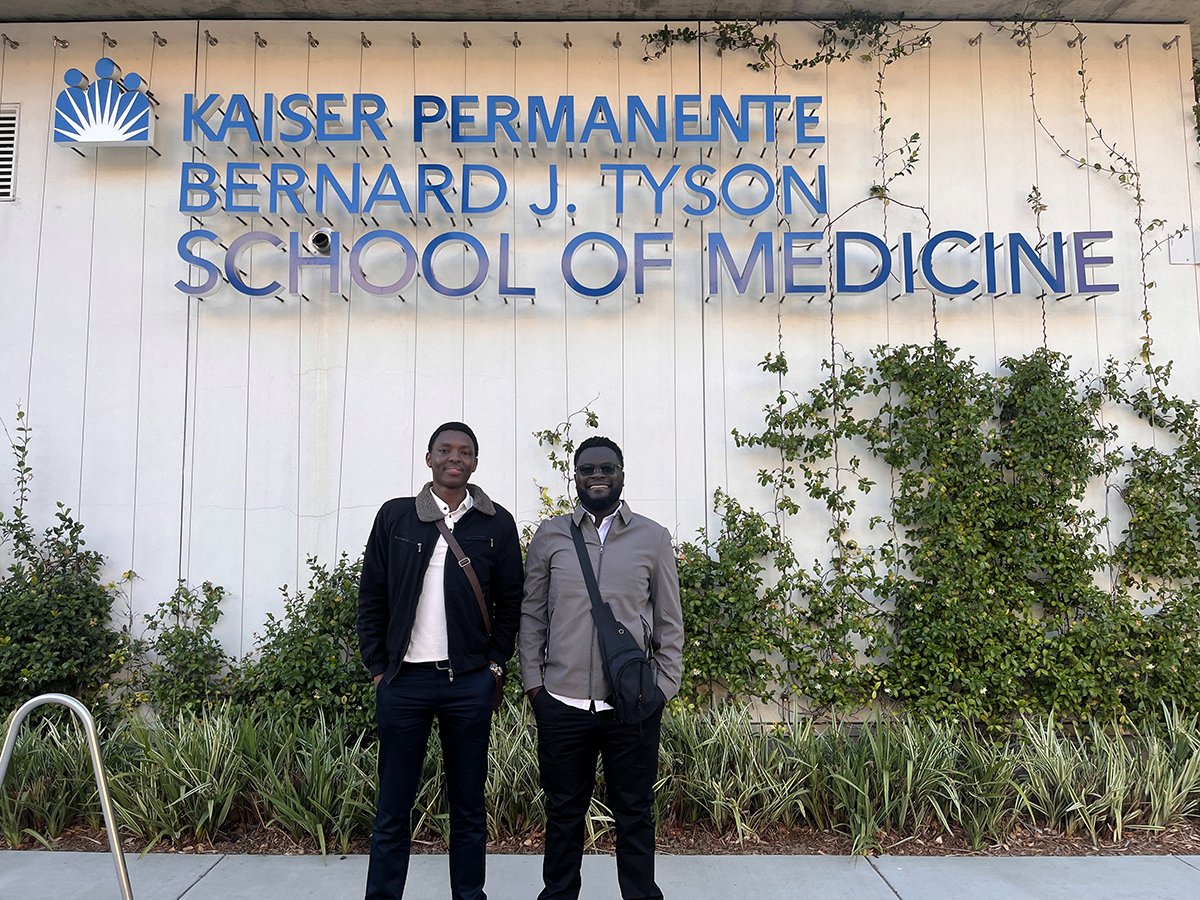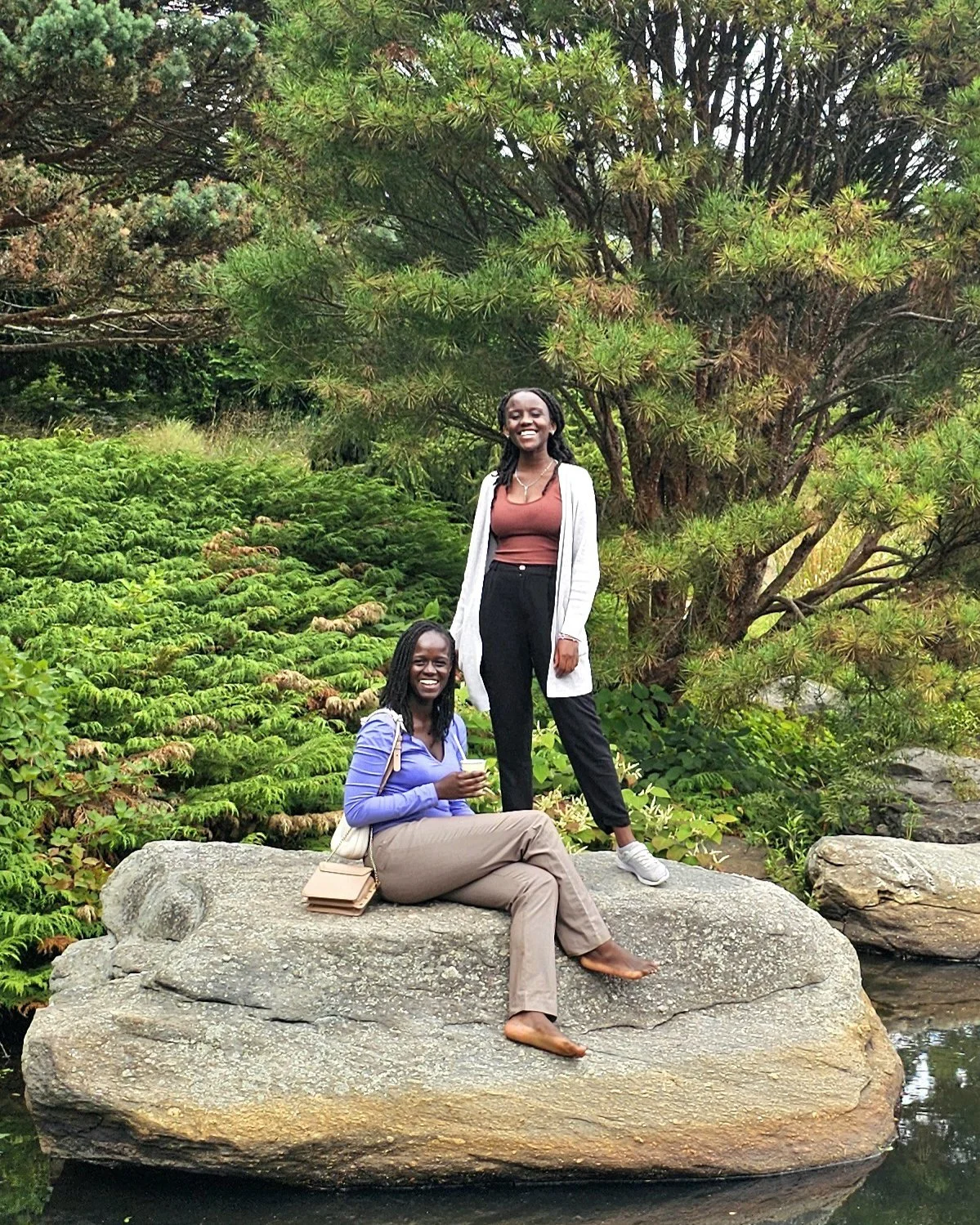Medical Trainees Cross the Globe for Educational and Life Experiences
Medical trainees from across the AMPATH partnership spent the summer and early fall immersed in bidirectional learning opportunities and building connections with their colleagues from around the globe.
Twenty-nine Moi University students travelled to nine AMPATH partners. This year also marked the first Kenyan medical students to travel to AMPATH partner Dhulikhel Hospital in Nepal and the first students from the University for Development Studies in Ghana to complete rotations at IU and Temple University in addition to New York University (see video at left).
Four Slemenda Scholars who just completed their first year of medical school also got an early opportunity to learn about AMPATH Kenya.
Read reflections from SlemEnda Scholars Lanie Rogers, Aliya Storms and Alison Stogsdill
IU nursing students traveled to Kenya and welcomed Moi University nursing students to IU.
Read more about their visit
Many of the Moi students who traveled to AMPATH partners share their experiences (some responses have been edited for length):
Dhulikhel Hospital in Nepal
Brian Mwangi: I had many memorable moments but the special ones are partaking in the surgical training workshop which was organized during my second week by Dr. Kate and Dr. Robin (very much grateful for their help); observing an arthroscopy surgery with bankart repair during my 3rd week with the head of orthopedic department (Dr. Rohit Shrestha), hiking to Nagarkot (there were some mishaps such as the leeches incident); and the morning classes in the department.
The whole elective gave me an opportunity to interact with other international students and learn how their medical schools run and what opportunities there are for me to pursue especially when it comes to my post-graduate program. I had a set attitude toward orthopedics based on what I had heard, but rotating there and seeing all the great work the whole team was doing got me thinking it's a cool department that I could possibly try out.
Thank you so much to AMPATH, Dhulikhel Hospital (the Orthopaedic Department), Moi University and special thanks to our coordinator Dr. Kate (Anderson) who took really good care of us.
Alvin Cheruiyot: The most memorable thing within the hospital setting that I was able to do was assisting in a laparoscopic cholecystectomy together with Dr. Yagya. Additionally, I was equipped with basic surgical skills in a training session led by Dr. Robin!
In addition the trip to Hindi was quite an eye opener in the efforts to deliver healthcare to remote areas that are quite often underserved in many areas of the world.
The elective period reaffirmed my interest to pursue surgery in my career. This opportunity granted me an insider view on how a patient is handled from walk-in to post-op management which was quite refreshing. I'm grateful to the surgical residents and attendings who were very helpful in my efforts to understand this process. Additionally, I believe the experiences and lessons I've gleaned from my seniors will play a big role in my future career.
Duke University
Beverline Mocheche: I had a transformative experience at Duke University where I learnt the importance of collaborative efforts amongst health care providers to achieve better patient outcomes. My main take away practices would be to be a good team member and to actively involve my patients in decision-making process.
Faiqa Shahame: During my elective, I learned that effective patient care relies on strong teamwork, clear communication, good time management, and a commitment to holistic, patient-centered practice. I also gained insight into the importance of global health initiatives in improving equity and addressing emerging health challenges. Overall, the experience strengthened my professional discipline and deepened my understanding that compassionate, collaborative care is at the heart of good medical practice
Kaiser Permanente
Ernest (Adrian) Kuloba: The most memorable thing so far has been to observe surgeries done with the DaVinci. It's an incredible piece of technology that benefits both patient and surgeon tremendously.
I want to become a cardiologist and yes, this experience has definitely had a huge impact on that. I have been able to see how wide the field itself is and how specialized each subspecialty is in that regard.
Peter I. Murage: The most memorable experience for me so far has definitely been observing robotic surgery. Getting the chance to not only watch but also briefly test the robotic system was truly eye-opening. It showed me how far technology has come in transforming precision and patient outcomes in surgery, an unforgettable glimpse into the future of medicine.
I envision a future career in urology, and my time at Kaiser Permanente, especially exposure to robotic surgery, has been transformative. It has given me firsthand insight into advanced patient-centered care and surgical innovation. This experience has not only expanded my understanding of what's possible in the field, but also strengthened my resolve to pursue urology and hopefully help introduce such advancements back in Kenya.
University of Texas at Austin
Kevin Kiplangat Kiprono: During my time in the clinical setting, one of the most profound lessons I’ve learned is the transformative power of patient-centered care and effective communication. I’ve witnessed how trust and empathy between provider and patient can lead to significantly better health outcomes, particularly in underserved communities. One moment that stands out was during a planned follow-up with a patient who was to be discharged. Despite limited resources and time, the attending physician made a point to contact the patient’s primary care provider, ensuring that the care plan would be continued seamlessly. Watching that level of commitment—extending beyond the hospital walls—taught me that medicine is not just about treating illness but about sustaining health through relationships, advocacy, and long-term support.
These experiences have shaped my vision for the future. I aspire to become a compassionate and skilled healthcare provider who serves vulnerable populations with integrity and purpose. This opportunity has not only strengthened my clinical abilities but also deepened my understanding of the social determinants of health. It has given me a clearer sense of the kind of physician I want to become—one who is not only clinically competent but also deeply attuned to the broader context of each patient’s life. I believe these insights will guide my future practice, inspire my commitment to health equity, and empower me to contribute meaningfully to building stronger, more inclusive healthcare systems.
University of Virginia
Christian Imani: The most memorable experience for me has been learning and practicing ultrasound imaging, particularly the FAST (Focused Assessment with Sonography for Trauma) exam. Coming from a setting where such point-of-care imaging is not always readily available, it was eye-opening to see how quickly it can guide critical decisions in trauma and emergency care. I was intrigued by how it ties anatomy to immediate clinical action, and how it enhances bedside decision-making without delay. Getting hands-on with FAST not only built my technical skills but also deepened my appreciation for the role of technology in improving patient outcomes.
I envision a medical career that is both clinically excellent and globally relevant. While my training in Kenya has given me a solid foundation, this opportunity has broadened my perspective on career options, showing me that my path is not limited to the few specialties or roles commonly pursued back home. Exposure to diverse health systems, specialties, and teaching styles has encouraged me to think more expansively, whether in global health, academic medicine, emergency care, or subspecialties I hadn’t considered before like family medicine.
Edwin Ruto Riwoi: Some of my most memorable experiences were:
Learning to perform FAST (Focused Assessment with Sonography in Trauma) exams. I hadn’t had the chance to practice back in Kenya.
Shadowing in the Emergency and Family Medicine Departments was also great. Residents were welcoming and engaged us well.
Volunteering at the Charlottesville Free Clinic was deeply moving and reinforced the importance of giving back to society and helping those who face barriers to healthcare. It was my first time volunteering, thanks to Dr. Brian Elmore.
Visiting the U.S. alone was in itself a memorable and formative experience. I had a chance to explore Washington, DC which I can say was my dream.
Enjoying local cultural events such as Paint the Town Orange and Fridays After Five and exploring the downtown mall area. Thanks to Paige!
The experience was truly eye-opening and has broadened my perspective on medicine. It inspired me to strive for clinical excellence while also improving access to and quality of healthcare back home and motivated me to consider pursuing residency in the U.S. in the future. It also sparked a greater interest in global health and its impact and encouraged me to become a more frequent volunteer in community health initiatives.
Brown
Daphy Taka: The most memorable thing I have learned so far is that all cultures are beautiful and unique in their own ways. I've gotten to meet people from different walks of life, shared meals with them, shared conversations, and felt at home in every instance. I know this will shape me into a more open-minded and compassionate healthcare provider as I continue to advance in my career.
For my medical career, I want to grow into a truly competent doctor—someone with the knowledge and confidence to care for patients without hesitation. Being here at Brown, I’ve seen that assurance in attendings, residents and even medical students. This inspired me to work toward developing that same level of skill and confidence.
Veronicah Mumbu: One of my most memorable experiences has been participating in a family meeting where we supported a patient and their loved ones in making a difficult decision about starting dialysis. It showed me that medicine goes beyond prescribing treatments—It also involves guiding patients and offering reassurance during vulnerable moments. Outside the hospital, I have enjoyed experiencing different cultures through events like the Renaissance Fair and a Greek festival, which have made me more adaptable and open-minded.
I envision being a doctor who is thorough in working up patients in terms of history-taking, physical examination, and managing patients to give them nothing but the best and to impact their lives positively. This opportunity has helped me broaden these skills by working up and managing patients in the hospital. It has also allowed me to observe Brown attendings, residents and students who are quite competent in their work.
Indiana University
Whitney Mabwi: The most memorable moments for me have not only been inside the hospital but also in the quiet, unhurried spaces outside it. Conversations shared over dinner with the Mamlins, and the long drive to/from Chicago with Dr. David Matthews. Listening to their stories—of sacrifice, of service to the underserved, and of the vision that eventually gave rise to the AMPATH program has been profoundly moving. What struck me most was how their work has rippled outward, touching lives across the world, including mine. Their journeys reminded me that hope for humanity still burns bright, that service can transform communities, and that we too are called to carry that torch forward. In those moments, brief though they were, I felt something awaken in me: a desire to change the world, to make healthcare more equitable, and to stand as an ambassador for the vision they have lived so faithfully.
My time at Eskenazi Hospital has given me a glimpse of the kind of physician I aspire to become. In trauma surgery, I was fascinated by minimally invasive approaches that drastically improve patients’ recovery journeys. These encounters impressed upon me the power of innovation to reshape care, and I carry with me the hope of advocating for similar advances back home in Kenya.
Evans Musto: One of the most memorable experiences during my elective was the opportunity to participate in the surgical skills lab where I practiced suturing, laparoscopy, and even had exposure to robotic techniques. Coupled with observing live robotic surgery, this gave me a first-hand appreciation of how surgical innovation is transforming patient care. Beyond the operating room, I also valued actively clerking patients in clinic and joining the internal medicine team on structured table rounds, which highlighted for me how essential strong clinical skills, teamwork, and attention to detail are in providing excellent patient care.
I envision a career in surgery, where I can combine technical skill with compassionate patient care. This elective has been transformative in solidifying that goal. The balance of surgical innovation and patient-centered care I witnessed at Eskenazi has inspired me to pursue a path where I can not only master operative techniques but also contribute as a mentor, teacher and advocate for my patients. I believe the lessons and perspectives I gained here will continue to guide me as I grow into the kind of surgeon I aspire to become.
Laura Cherotich: This exchange program has broadened my perspective on patient-centered care and resource utilization. Through the opportunity to actively engage in patient care within a multidisciplinary setting, I was able to observe how collaborative approaches between different specialties enhance patient outcomes.
I also envision building a career in medicine that combines clinical care, teaching, and research, with a strong focus on people's health. The exposure I gained will guide me to become not only a better clinician but also an advocate for strengthening healthcare systems through global collaboration.
I believe the lessons learned will influence the way I approach patients, work with colleagues and mentor future medical students. If I’m in a position later in my country where I can influence policy making, I'll have useful insights concerning health care and health systems as a whole. This experience has been an eye opener on what policies should be put in place in our setting here.
Gachuhi Simon Gathogo: During my six weeks in Indianapolis, the most memorable aspect of my experience was the opportunity to actively engage in diverse clinical environments while learning from some of the finest physicians at Lois and Sidney Eskenazi Hospital. My surgical rotation was particularly formative, as it provided hands-on exposure to procedures and decision-making processes that deepened both my technical and clinical acumen. Internal medicine offered me a chance to strengthen my diagnostic reasoning.
I envision a medical career that is grounded in clinical excellence, enriched by global perspectives, and centered on advancing patient outcomes through both practice and mentorship. I believe that the lessons learned in Indianapolis will continue to guide my career trajectory, equipping me to contribute meaningfully not only to patient care but also to the broader medical community.
Hawawu Abdul Nasir (Ghana): I hope to become a physician who not only treats diseases but also understands and connects with patients as people. My rotation at Eskenazi Hospital has deeply shaped this vision. Being fully included in the internal medicine team made me feel like a valued member of the group. These experiences strengthened my confidence, clinical reasoning and communication skills.
The most memorable moment was getting to scrub in for a cesarean section. It was my first time scrubbing in for a surgery of any kind and I was amazed by how fast the whole procedure was. I have witnessed cesarean sections but this particular one was so amazing. Within minutes, the baby was out and crying. It was such a beautiful moment that reminded me why I chose medicine: to be part of those life-changing experiences where skill, teamwork and compassion come together.
My attending constantly pushed me to think critically and step outside my comfort zone, even when I wasn’t fully confident in myself, but always in a supportive and encouraging way. That gentle push helped me grow more than I expected, and it’s something I’ll always be grateful for. I hope to carry that forward in my own future to challenge and uplift medical students or colleagues in the same way, with patience and encouragement.
Hickma Abdulai (Ghana): This experience has truly shaped the kind of doctor I aspire to become. I’ve learned the importance of keeping patients informed and actively involved in their care, and I hope to bring that same compassion and openness into every patient interaction in the future. I’m also deeply inspired to work toward reducing healthcare disparities. Experiencing the healthcare system here made me realize that Ghana can also achieve this level of excellence. As Joe Mamlin reminded us during dinner, I am the future, and I believe I can help create the change I want to see. Thank you so much for this wonderful opportunity.
My most memorable moments were in Chicago. Exploring the city by boat, visiting museums, trying new foods--it truly felt like living the American life I had hoped to experience during this visit.
University of Toronto
Faith Kiprop: One major highlight was the Twins Clinic with Dr. Nir Melamed, who took time to explain complex management concepts using flowcharts and case discussions. Also, I spent time in the Genetics Clinic with Dr. Ori Nevo and the radiology team, where I learned about prenatal genetic screening and diagnostics, gained exposure to techniques such as NIPT, and learned to interpret ultrasound findings more confidently.
My experience showed me that specialization can extend far beyond traditional boundaries. Many of the fellows not only were specialists but had subspecializations: some in genetics, others in twin and multiple gestation care, diabetes management, or fertility medicine.
Toronto completely stole my heart! What struck me most was how picturesque it was. The skyline, the lights, the clean streets, it all felt like something out of a postcard. Memorable excursions include the Toronto Exhibition, such a fun and chaotic burst of cultures, food, and colour. Let’s just say fried melon and ice cream with chicken is something I’ll never forget.
Ubah Bishar: I really enjoyed the ob-gyn clinic, where the well-planned monitoring of pregnancy was clearly and thoughtfully articulated. I was also able to learn and assist with deliveries, thanks to the support of the staff, especially Drs. Stephen Im, Rachel Spitzer, and Bunmi Adesanya. My clerkship at Mount Sinai Hospital and St. Michael’s Hospital was both fun and enriching, and the guidance from the chief residents, Drs. Yannay Khaikin and Mary Boulos, as well as Dr. Rawan Aljumah, helped me immensely in Labour and Delivery! I can’t forget the medical students! They helped me navigate the hospitals and gave me support throughout.
This experience has significantly expanded my knowledge in obstetrics and gynaecology, particularly in the surgical aspects. Observing laparoscopic salpingectomies and assisting in several surgeries was a mind-blowing experience that I will carry with me as I continue my studies and shape my future career path.
Toronto is a beautiful city full of people from different parts of the world. This was my first time traveling outside Kenya, making the experience even more memorable. I am grateful to have seen Niagara Falls and enjoyed events like the CNE festival. Dinners at the Kembers and with Dr. Spitzer were wonderful, and the Eaton Centre quickly became a favorite spot.
Read more about Faith and Ubah
Linköping University (Sweden)
Elvis Kiprotich Kipyator: The most memorable thing I’ve experienced so far has been seeing how healthcare works in a developed country. The organization, availability of resources, patient care and teamwork among staff have stood out to me. I’ve also learned how important punctuality is here in Sweden. It’s truly part of the culture. Beyond the hospital, I’ve appreciated the exposure to a different way of life, including how people balance work, rest, and social life, which has been eye-opening.
I see myself working as a well-rounded doctor who helps to improve healthcare systems while also offering top-notch patient care. This experience has been significant since it has taught me how a developed nation's healthcare system operates; particularly how many departments work together through multidisciplinary conferences to guarantee comprehensive patient care.
Glaudia Chebet (Nursing): I have learned the importance of treating patients with kindness, respect, and genuine engagement, which greatly enhances their care experience. I was struck by the culture of honesty and integrity in everyday life—for example, people consistently pay for their bus tickets and strictly follow traffic regulations, even when no one is watching.
I envision building a career as a nurse who is dedicated to providing safe, compassionate, and patient-centered care. Nursing, to me, is more than just carrying out procedures—it is about advocating for patients, listening to their needs, and ensuring they feel respected and cared for during moments of vulnerability. I aspire to grow into a nurse who combines clinical competence with empathy, integrity, and professionalism, while also contributing to educating and supporting future healthcare providers.
Abigael Jemutai Buigut : At the Linköping Universitetssjukhuset (University Hospital) I learnt that patient care is taken very seriously. Decisions on treatment plans are made by a multidisciplinary team. No decision is made without consulting all the healthcare providers involved in the care of the patient, that is primary doctors, specialist doctors, nurses, physiotherapists, radiologists, counsellors etc. They regularly have consultative multidisciplinary meetings and discuss each patient paying attention to all aspects of care and this greatly improves patient outcomes.
I had never seriously thought about a career in any surgical field. But after rotating in the departments of neurosurgery, hand surgery, and plastic surgery at Linköping Universitetssjukhuset, I am now very interested and I can see myself in surgery one day. I am glad that this opportunity was able to help me discover fields that I am drawn to.
Sarah Chepyegon Karem: The most memorable part has been witnessing robotic surgery for the first time. It was incredible to see how technology is changing patient care. Equally impressive was my time in anesthesiology department where I observed patient care as a holistic process; from preparation and system monitoring to emphasis on teamwork between doctors, nurses, and other healthcare professionals as well as how patients are actively involved in decision-making. Outside the hospital, adapting to Swedish culture and daily life has been equally eye-opening and all these experiences have broadened my perspective on both medicine and life.
I envision myself building a career in medicine, with a focus on patient-centered, evidence-based care. This exchange has been very impactful, it has shown me what’s possible with teamwork, innovation and patient involvement. These lessons will stay with me as I pursue residency and beyond, strengthening my ability to work in diverse healthcare environments and contribute meaningfully wherever I practice.













